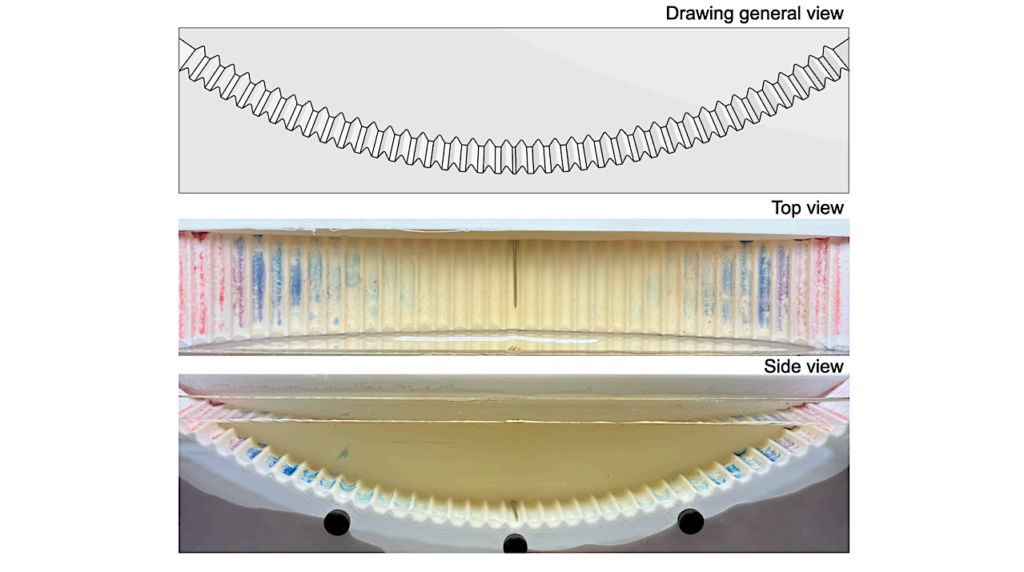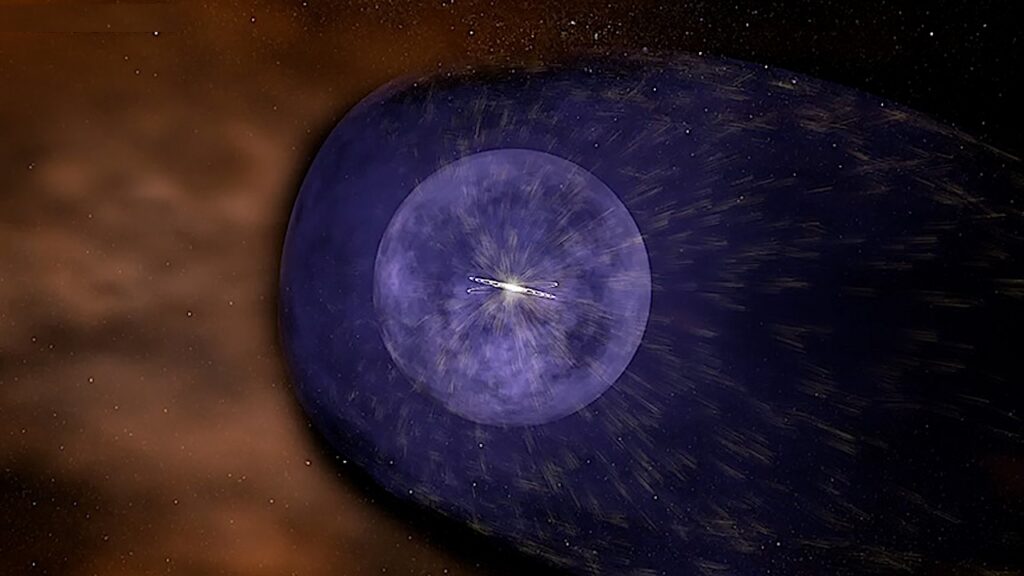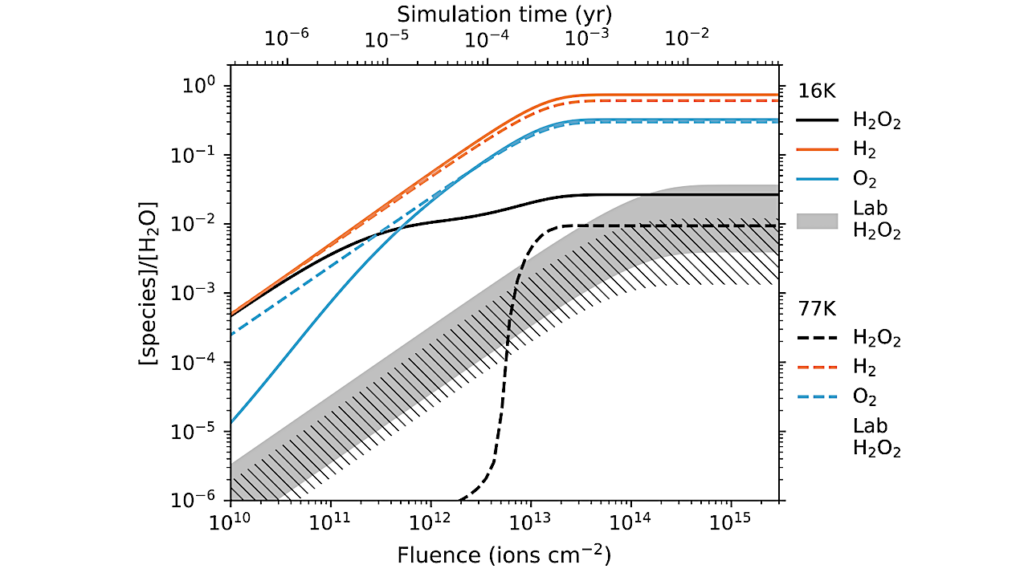Astrochemistry In The Central Molecular Zone Of The Milky Way

Astronomers have captured the central region of our Milky Way in a striking new image, unveiling a complex network of filaments of cosmic gas in unprecedented detail. Obtained with the Atacama Large Millimeter/submillimeter Array (ALMA), this rich dataset — the largest ALMA image to date — will allow astronomers to probe the lives of stars in the most extreme region of our galaxy, next to the supermassive black hole at its centre.
“It’s a place of extremes, invisible to our eyes, but now revealed in extraordinary detail,” says Ashley Barnes, an astronomer at the European Southern Observatory (ESO) in Germany who is part of the team that obtained the new data. The observations provide a unique view of the cold gas — the raw material from which stars form — within the so-called Central Molecular Zone (CMZ) of our galaxy. It is the first time the cold gas across this whole region has been explored in such detail.
The region featured in the new image spans more than 650 light-years. It harbours dense clouds of gas and dust, surrounding the supermassive black hole at the centre of our galaxy. “It is the only galactic nucleus close enough to Earth for us to study in such fine detail,” says Barnes. The dataset reveals the CMZ like never before, from gas structures dozens of light-years across all the way down to small gas clouds around individual stars.
The gas that ACES — the ALMA CMZ Exploration Survey — specifically explores is cold molecular gas. The survey unpacks the intricate chemistry of the CMZ, detecting dozens of different molecules, from simple ones such as silicon monoxide to more complex organic ones like methanol, acetone or ethanol.
Cold molecular gas flows along filaments feeding into clumps of matter out of which stars can grow. In the outskirts of the Milky Way we know how this process happens, but within the central region the events are much more extreme. “The CMZ hosts some of the most massive stars known in our galaxy, many of which live fast and die young, ending their lives in powerful supernova explosions, and even hypernovae,” says ACES leader Steve Longmore, a professor of astrophysics at Liverpool John Moores University, UK. With ACES, astronomers hope to better understand how these phenomena influence the birth of stars and whether our theories of star formation hold in extreme environments.

This image shows the complex distribution of molecular gas in the Central Molecular Zone (CMZ) of the Milky Way. It was obtained with the Atacama Large Millimeter/submillimeter Array (ALMA), in which ESO is a partner. This map is as long as three full Moons side-by-side in the sky, and it is in fact the largest ALMA image ever obtained. ESO – Larger image
“By studying how stars are born in the CMZ, we can also gain a clearer picture of how galaxies grew and evolved,” Longmore adds. “We believe the region shares many features with galaxies in the early Universe, where stars were forming in chaotic, extreme environments.”
To collect this new dataset, astronomers used ALMA, which is operated by ESO and partners in Chile’s Atacama Desert. In fact, this is the first time such a large area has been scanned with this facility, making this the largest ALMA image ever. Seen in the sky, the mosaic — obtained by stitching together many individual observations like putting puzzle pieces together — is as long as three full Moons side-by-side.
“We anticipated a high level of detail when designing the survey, but we were genuinely surprised by the complexity and richness revealed in the final mosaic,” says Katharina Immer, an ALMA astronomer at ESO who is also part of the project. The data from ACES are presented in five papers accepted for publication in Monthly Notices of the Royal Astronomical Society, with a sixth in the final review stages.
“The upcoming ALMA Wideband Sensitivity Upgrade, along with ESO’s Extremely Large Telescope, will soon allow us to push even deeper into this region — resolving finer structures, tracing more complex chemistry, and exploring the interplay between stars, gas and black holes with unprecedented clarity,” says Barnes. “In many ways, this is just the beginning.”

This montage shows the distribution of different molecules in the Central Molecular Zone (CMZ) of the Milky Way. The observations were made with the Atacama Large Millimeter/submillimeter Array (ALMA), as part of the ALMA CMZ Exploration Survey or ACES. ACES has mapped the distribution of several dozen molecules at the centre of our galaxy. Here we show five of them, from top to bottom: carbon monosulphide, isocyanic acid, silicon monoxide, sulphur monoxide, and cyanoacetylene. Credit: ALMA(ESO/NAOJ/NRAO)/S. Longmore et al. Larger image
More information
This research was presented in a series of papers presenting the ACES data, to appear in Monthly Notices of the Royal Astronomical Society:
- Paper I – ALMA Central molecular zone Exploration Survey (ACES) I: Overview paper
- Paper II – ALMA Central molecular zone Exploration Survey (ACES) II: Continuum imaging
- Paper III – ALMA Central molecular zone Exploration Survey (ACES) III: Molecular line data reduction and HNCO & HCO+ data
- Paper IV – ALMA Central molecular zone Exploration Survey (ACES) IV: Data of the two intermediate-width spectral windows
- Paper V – ALMA Central molecular zone Exploration Survey (ACES) V: CS(2-1), SO 2_3-1_2, CH3CHO 5_(1,4)-4_(1,3), HC3N(11-10) and H40A lines data
- Paper VI – ALMA Central molecular zone Exploration Survey (ACES) VI: ALMA Large Program Reveals a Highly Filamentary Central Molecular Zone (undergoing minor revision)
The data itself will be available from the ALMA Science Portal at https://almascience.org/alma-data/lp/aces.
Astrobiology, Astrochemistry,








